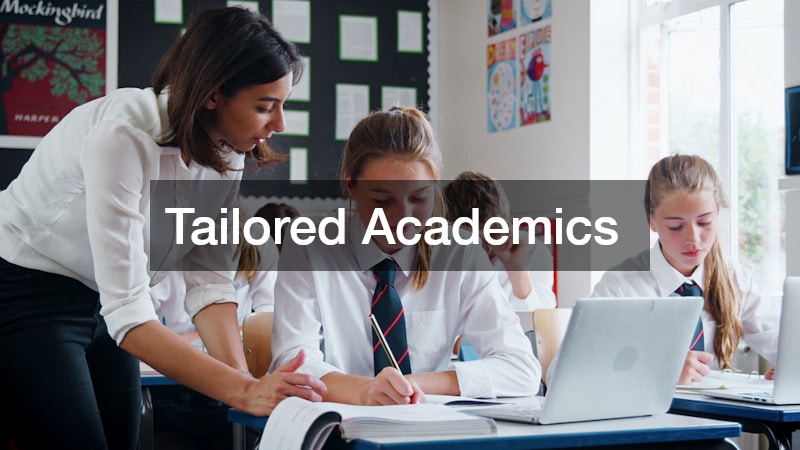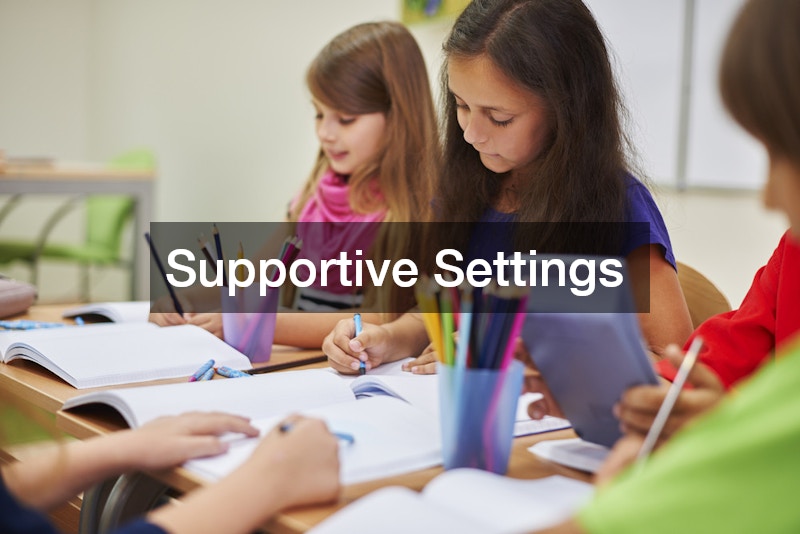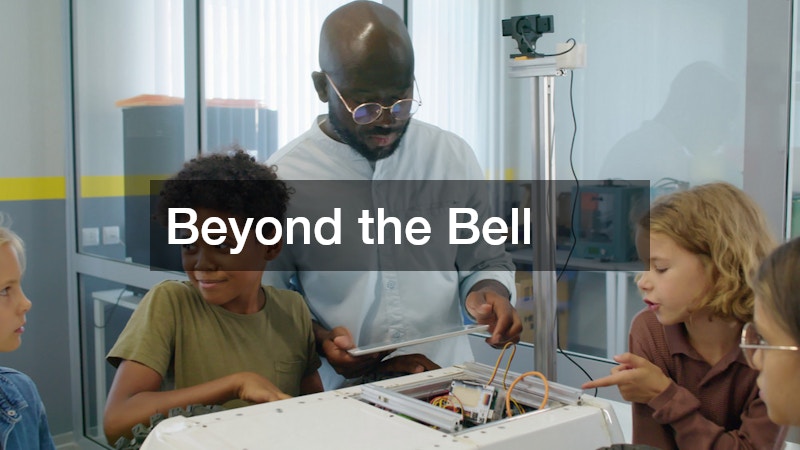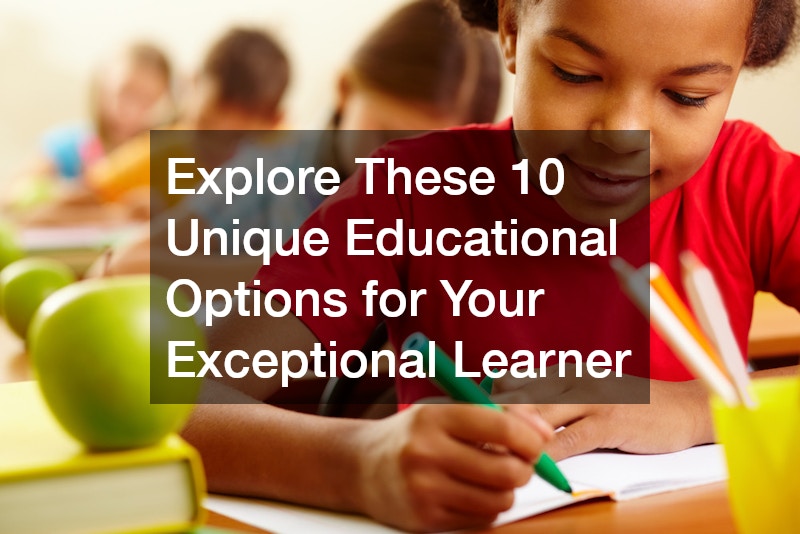Every child learns in their way, but some require a more tailored approach to truly thrive. These exceptional learners often benefit from educational paths that go beyond the traditional classroom. Whether they need extra challenges, emotional support, or learning strategies that reflect their specific strengths, the right setting can make all the difference. The good news is that many flexible and creative opportunities provide more than just the standard model of instruction. These alternatives can nurture academic growth, encourage confidence, and help children reach their full potential in a way that fits who they are. Whether your child is gifted, neurodivergent, or facing specific learning challenges, finding the right environment can make a profound difference in both academic performance and emotional well-being.
Understanding which environment works best starts with looking at the wide range of unique educational resources available today. Some settings offer smaller group sizes and more focused attention, allowing for personalized instruction and meaningful engagement. Others are built around student-driven learning, offering freedom to explore topics at a comfortable pace. Even public options are evolving, with many providing extra support services and inclusive environments that encourage diverse learners to succeed. For families of special needs learners, knowing these paths exist is often the first step toward making a more informed and empowering choice.
In addition to school-based options, there are also helpful supports that extend learning beyond the traditional day. Early care environments can offer a strong foundation for growth, especially when built around play-based learning and emotional development. Programs that run after hours often introduce new skills in fun and engaging ways, giving children the opportunity to grow socially and academically. Some services address emotional needs or provide specialized instruction, which can be especially helpful for children who learn or behave differently. Physical activities, creative outlets, and one-on-one mentorship all play an important role in shaping a well-rounded learning experience. These resources can be incredibly valuable when building a supportive ecosystem around your child.
In this article, we’ll explore ten unique educational choices that may be the perfect match for your child. Whether you’re just starting your journey or looking to improve your current strategy, these ideas will help guide your decisions. Together, they create a roadmap for providing an education that is not only effective but truly empowering.
Tailored Academics

Exceptional learners thrive in environments that are built around their strengths, and that’s where private schools often shine. These institutions have the flexibility to create specialized curricula that cater to a child’s learning pace, interests, and academic goals. Smaller class sizes, individualized attention, and enriched programs allow for a level of customization that public settings sometimes struggle to offer.
Private schools provide tailored academic paths that include project-based learning, one-on-one mentorship, and extracurricular opportunities that align with a student’s talents. This can be incredibly beneficial for young learners, especially those who are gifted or have specific learning differences that require differentiated instruction.
The nurturing and focused environments of private schools also promote emotional well-being, a key factor for children. These settings offer more than academics—they provide a holistic education where students feel recognized, valued, and empowered to reach their full potential.
Alternative Learning
For students who don’t fit within traditional academic molds, an independent school can offer the freedom and flexibility needed to flourish. These schools are not bound by state-mandated curricula, giving educators the liberty to craft lessons around students’ unique learning styles and interests. This autonomy can be transformative for learners who need a more creative or student-centered approach.
Independent schools typically emphasize project-based learning, interdisciplinary coursework, and experiential education. Special needs learners often benefit from this hands-on, inquiry-driven style, which encourages deeper exploration and critical thinking without the pressures of standardized testing.
The culture at an independent school is often one of inclusion, diversity, and innovation. These values create an environment where students are supported not only academically but socially and emotionally as well, helping them build confidence, curiosity, and resilience in meaningful ways.
Supportive Settings

Although alternatives exist, many families still find strong, supportive resources within the traditional public school system. With the growing awareness of diverse learning needs, public schools have become more equipped to accommodate exceptional learners through specialized programs and personalized support.
Public school systems offer access to services like IEPs (Individualized Education Programs), 504 plans, and inclusion classrooms that are designed to address various academic and behavioral challenges. These tools ensure that these kids receive appropriate support while remaining integrated into the broader learning environment.
What makes a public school a valuable option is its accessibility and wide-ranging services that cater to all learners. For exceptional students, this means receiving a quality education close to home while benefiting from peer interaction, certified special educators, and federally mandated supports that advocate for their educational success.
Early Growth Paths
Early intervention plays a crucial role in setting the stage for a child’s future/ A well-structured childcare center can provide the early academic and social framework needed to prepare young learners for formal schooling and lifelong success.
A high-quality childcare center recognizes early signs of giftedness or developmental delays, giving educators and parents a head start on offering the right supports. With routines, sensory play, and guided activities, these centers promote language development, emotional regulation, and motor skills—areas where young kids often need focused attention.
Choosing a childcare center that emphasizes early childhood education can make a significant impact. These early growth paths instill confidence, curiosity, and adaptability, forming the building blocks for more advanced learning down the road.
Beyond the Bell

Afterschool programs are more than just a place to stay once classes are over—they are extensions of the learning day that offer enriching, structured experiences. These programs provide a critical outlet for creativity, exploration, and social engagement beyond the classroom.
High-quality afterschool programs often include homework assistance, STEM activities, the arts, and physical recreation. These activities reinforce academic concepts in fun, informal ways while helping children build interpersonal skills and self-confidence. This means having space to pursue their interests without the rigidity of a standard classroom.
Participation in after-school programs can also ease transitions, reduce stress, and boost overall well-being. Exceptional learners benefit immensely from environments where they can safely explore new skills, build friendships, and find joy in learning outside traditional settings.
Adaptive Guidance
For many kids with different abilities, thriving in an educational environment means more than just mastering academics—it means having the right emotional and developmental support. Special needs care services provide customized strategies to help children overcome challenges and build essential life skills.
These services often include therapies such as speech, occupational, or behavioral interventions, which are crucial for children with autism, ADHD, or other developmental differences. Through individualized attention, consistent routines, and evidence-based techniques, special needs care professionals create stable, responsive settings where learning can take root.
Whether used independently or alongside formal schooling, special needs care provides a safety net for special needs children. It ensures they have access to the emotional and cognitive support necessary to function confidently and independently, both in and outside the classroom.
Trusted Help Nearby

Sometimes the key to educational progress lies not in the classroom, but at home or in a familiar environment. A skilled local caregiver can play a vital role in supporting exceptional children particularly when consistency and individualized attention are needed throughout the day.
Local caregivers often assist with routines, transportation, homework help, and emotional support. Their close relationship with the child allows them to observe and respond to subtle changes in behavior or mood, which is especially important for differently-abled learners who may struggle with transitions or sensory sensitivities.
Having a dependable local caregiver adds an extra layer of comfort and stability for both the child and their family. When these caregivers understand and respect a learner’s unique needs, they become an indispensable part of the broader educational ecosystem.
Skill-Building Fun
Not all learning is academic, and for exceptional learners, physical activity can be a powerful teaching tool. A swim school is an excellent example of an environment that builds strength, coordination, and confidence, while also supporting sensory regulation and focus.
Swim instruction teaches goal setting, listening skills, and self-discipline through a fun and engaging format. Many swim schools accommodate learners with diverse needs by using visual cues, repetitive instruction, and gentle pacing—ideal strategies for children who process information differently.
Participating in a swim school often goes beyond physical development. It fosters emotional resilience, enhances social interaction, and provides a sense of accomplishment that carries over into classroom performance and everyday life.
Emotional Tools
Emotional well-being is a cornerstone of academic and personal growth. For exceptional learners who may face unique social or psychological challenges, access to a counseling service can make a world of difference in how they navigate their educational journey.
A counseling service provides safe, confidential spaces where children can learn to express their feelings, manage anxiety, and develop coping mechanisms. Sessions may involve play therapy, cognitive-behavioral strategies, or family support, all tailored to the child’s individual needs.
When these children receive emotional tools through counseling, they gain the self-awareness and confidence needed to succeed. These services support not only the child but the entire family, helping everyone understand and meet the learner’s unique challenges.
Creative Expansion
Creative outlets are essential for holistic development, and an enrichment program can offer just that. These programs give students the chance to explore their passions, whether in the arts, sciences, or technology—, elping them discover new ways to think and express themselves.
An enrichment program might include robotics, painting, theater, or coding, providing hands-on opportunities to engage with content beyond the typical curriculum. Children often excel in such settings, where the freedom to innovate and experiment nurtures both skill and confidence.
Participation in an enrichment program empowers exceptional learners to explore and refine their talents. These experiences are not just about having fun, they’re about unlocking potential and building the curiosity and motivation that drive lifelong learning.
Supporting Every Step of the Journey
Every child deserves an educational journey that reflects their unique strengths, passions, and needs. For the exceptional learner, finding the right support system is key to unlocking their full potential. Whether through private schools, enrichment programs, or local caregivers, the goal remains the same: to nurture the whole child in ways that honor their individuality.
By exploring these ten educational options, families gain a toolkit for choosing the environments and services that align best with their child’s personality and learning style. These choices are not always easy, but they are deeply meaningful, shaping how special needs students view themselves and the world around them.
At the heart of each option is a commitment to understanding and support. When an exceptional learner is surrounded by people and programs that believe in their abilities, the results can be life-changing. With the right resources, every learner has the power to succeed, grow, and thrive.

